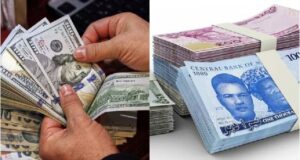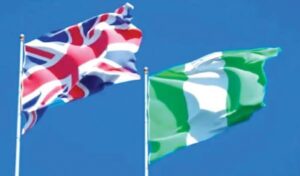
The Central Bank of Nigeria’s (CBN’s) ‘Naira for Dollar Scheme’, aimed at promoting diaspora remittances will be ending this Saturday. The two-month campaign, which started on March 8, has seen many diaspora remittances recipients get rewarded with N5 for every dollar received. The policy creates opportunity for banks to utilise their products and investments’ vehicles to attract foreign capital from Nigerians in the diaspora.The campaign has led to significant increase foreign reserves and boosted dollar liquidity in the economy, writes COLLINS NWEZE.
Not many people considered the possibility of being rewarded for receiving dollar inflow from the diaspora.
That was before the take off of the Central Bank of Nigeria’s (CBN’s) ‘Naira dollar for Scheme’, which gives N5 rebate for every $1 sent by Nigerians in diaspora to the country. For instance, a customer that receives $10,000, gets N50,000 as reward.
According to the World Bank report, over $21 billion is received yearly through diaspora remittances into economy.
The CBN Governor, Godwin Emefiele, who announced the policy takeoff on March 8, said the money would be paid to the account of the diaspora remittances’ beneficiaries, following receipt of the remittance inflows. The initiative will be ending on May 8.
Emefiele explained that the move was also to increase the transparency of remittance inflows and reduce rent-seeking.
But the successes recorded so far in the scheme are attributed to the commitment shown by commercial banks to ensure its implementation by building patronage of their international money transfer offerings.
Several banks, including Ecobank Nigeria, Access Bank, United Bank for Africa, First Bank Nigeria, and Stanbic IBTC Bank, are committed to the scheme.
For instance, FirstBank of Nigeria Limited is in partnership with various international money transfer services, which include Western Union, MoneyGram, WorldRemit, RIA, Transfast and AWS Malta. The deals have helped the bank to attract more foreign capital to the economy and reaffirmed its leadership role in that business segment.
New IMTOs join scheme
The CBN’s scheme has led to increased participation by new players with over 12 new International Money Transfer Operators (IMTOs) being boarded. Many of the IMTOs have global presence, while some operate in over 250 countries.
The CBN has, however, restricted Payment Service Banks, Mobile Money Operators from playing in the space.
A Lagos-based forex dealer, Martins Stevens, said IMTOs have stronghold in various parts. “Western Union and MoneyGram have huge visibility in the United States, United Kingdom (U.K.) and Canada while Transfast is strong in the Middle East. What sometimes determine where the most forex flow in from is the number of Nigerians found in such a place. This further corroborates the fact that the U.S., U.K. remain the strongest points wherein where forex comes from,” he said.
He said FirstBank also pioneered international money transfer by ushering in Western Union International, which is the first-ever IMTO in the country. The bank has also introduced the dollar payout in 2002 as well as outbound service in Nigeria in 2014.
“Money transfer products are sold across all of the bank’s branches nationwide with over N100 billion transactions rendered to over one million customers in the last year,” he said.
He said the bank’s contributions to the money transfer business has led to awards/recognition received over the years in promoting forex remittances into the country. Some of the awards include “Fastest- Growing Money Agent Award” in 2010, MoneyGram’s“Highest Receiving Agent in Nigeria and the Most Compliant Agent in West Africa”.
The bank was also recognised by MoneyGram in 2016 as the first agent in West Africa and second largest agaent in Africa to process transactions that generated a revenue of $10 million on the MoneyGram platform, among others.
Stevens said the bank’s large branch network, excellent customer service, dedicated branches that work every day of the week to ensure its customers are served.
He explained that the bank’s auto creation of dollar account ensures that when transfer is sent to a beneficiary’s naira account, FirstBank automatically opens a dollar account for the beneficiary and credit the dollar into the account.
“The bank pays N5 for every dollar received in line with the CBN directive while its customers are at liberty to determine whether they want their dollar as cash or directly into their accounts,” he said.
The transaction takes place across the counter in any of the bank’s over 750 branches nationwide or as transfer into the customers domiciliary accounts.
FirstBank’s Chief Executive Officer (CEO), Adesola Adeduntan said: “At FirstBank, we are pleased to participate in the CBN’s ‘Naira 4 Dollar scheme’ as it will contribute to deepening financial inclusion in Nigeria. Indeed, it’s an activity we are pleased to lead, while promoting access to funds across the nooks and crannies of the country in almost 127 years of our existence.
“We are delighted to be a gateway to promoting dollar remittances into the country and we encourage our customers, their loved ones and friends to use our international money transfer services which would enable them to enjoy the rewards of this promo, sustaining the increase in inflows of diaspora remittances into Nigeria consequently help in poverty reduction, income redistribution and enhancement of economic growth.’’
Adeduntan said FirstBank pioneered international funds transfer and remittances over 25 years ago and has been at the forefront of promoting cross border payments in the country, having started the journey with Western Union Money Transfer.
Only recently, the bank launched the First Global Transfer (FGT) product to promote international transfer of funds across its subsidiaries in sub-Saharan Africa.
The bank’s subsidiaries in Africa include FBNBank Democratic Republic of Congo, FBNBank Ghana, FBNBank Gambia, FBNBank Guinea, FBNBank Sierra-Leone, FBNBank Senegal.
Policy gains by CBN
According to Emefiele, the new measure would help to make the process of sending remittance through banks cheaper and more convenient for Nigerians in the diaspora.
Citing cases in other climes, he said the use of reimbursements of remittance fees had been critical to supporting improved inflow of remittances to countries in South Asia and in improving their balance of payments position following the COVID-19 pandemic.
Noting that the average cost of sending $200 worth remittances to Nigeria from the United States was about 4.7 per cent, he said studies had shown that even a one percent decrease in the cost of sending remittance could result in a significant boost in inflows.
“Countries in South Asia such as Pakistan and Bangladesh are aware of this impact and they introduced reimbursement schemes to support inflows. In Pakistan the scheme, which is known as free send, has enabled record amount of inflows of over $2 billion monthly even during the pandemic.
“Bangladesh introduced its own scheme in June 2019, which is a two percent rebate on remittance inflows. Following this action, they have also seen a 20 per cent boost in remittance inflows,” he explained.
He said the new policy is expected to enlarge the scope and scale of foreign exchange inflows into the country with a view to stabilizing the exchange rate and supporting accretion to external reserves. More importantly, he said it would provide an opportunity for Nigerians living abroad to make investments in their home country.
Foreign reserves rise
The ‘Naira for Dollar’ policy of the Central Bank of Nigeria (CBN) has led to positive accretion to the foreign reserves exactly one month after takeoff.
The foreign reserves, on April 1, stood at $34.85 billion, representing $404 million increase compared to $34.41 billion on March 11.
The uptick in reserves has been attributed to CBN’s ‘Naira for Dollar’ policy which has seen dollar inflows pass through commercial banks, instead of unofficial channels.
Also helping reserves accretion is the continued rise in benchmark Brent crude oil price, which stood at $66.17 per barrel as at April 30, representing about $26.17 above the $40 per barrel benchmark for 2021 budget.
Also, Forex Trading Associate, AZA, a global forex dealer, Oghenefejiro Eduviere, said naira would remain stable on the parallel market, hovering around the N480 to N490 level, as the CBN’s ‘N5 for $1’ incentive scheme encourages forex flows to go through banks.
“We see trading on the Investors and Exporters (I&E) Forex window extending depreciation towards N435 in the short term,” he said in emailed notes to investors.
The naira strengthened on the parallel market, trading in the N485 to the dollar at the end of last week, while depreciating on the official I&E window, from N415 to N420 to dollar.
On the foreign reserves, Fitch Ratings, a global rating agency predicted that Nigeria’s external reserves would rise to $42 billion by year-end.
Also, in a report titled, “Depreciatory Pressures on Key Sub-Saharan African Currencies to Lessen,” Fitch Ratings said that given rising oil prices in 2021, it expects the Nigeria forex reserves to rise to an average of around $42 billion in 2021 (around eight months of import cover), compared to $36 billion in 2020.
“However, this will not negate the impact of persistent depreciatory pressures on the naira, notably as a result of rising dollar demand driven by the domestic economic recovery,” it stated.
Fitch Ratings had hinged the forecast on its expectation that Brent crude would average $53 per barrel, compared to the $43.1 per barrel recorded in 2020. Moreover, the agency anticipated that the CBN would allow the official naira exchange rate to depreciate further over the course of 2021, notwithstanding improved terms of trade and foreign exchange reserves.











